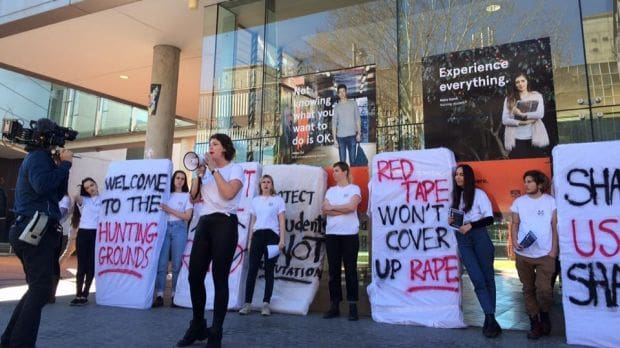Deputy Vice Chancellor (Registrar) Tyrone Carlin has promised student representatives a new sexual assault reporting system by semester one of 2017.
An expert, who was not identified by name, has been employed to undertake a review of the current system.
The new system will include a timeline for complainants and will emphasise the confidentiality of the process to students.
The news was communicated during a September 22 meeting between SRC Women’s Officer Anna Hush, Sexual Harassment Officer Olivia Borgese, Carlin and the Vice-Chancellor, Michael Spence.
“Reporting sexual harassment and, or assault is a traumatic event in itself. The current system is deeply flawed and needs to be overhauled to better support students,” Borgese said.
“This is a long overdue measure and will hopefully improve the sensitivity and transparency of this system,” said Hush.
The meeting comes after an open letter was signed by 10 years of women’s officers condemning the University’s delay in responding to sexual assault and harassment on campus.
“We take the issues seriously and want to work with students and their representatives as we continue to improve,” Spence said in a response letter.
Spence’s letter identified the University’s Creating a Safer Community for All survey undertaken last year and the new “program of cultural reflection and change” being discussed with the residential colleges as evidence of their efforts.
It invited student representatives to speak with Spence and Carlin, resulting in the September 22 meeting.
At the meeting, student representatives were informed of various developments since their last meeting with University management on June 24.
These include all staff members of the Student Affairs Unit undergoing training by Rape and Domestic Violence Services Australia to aid them in responding to students who disclose experiences of sexual assault.
Student representatives have also been promised ongoing consultation through focus groups.
Former Sex Discrimination Commissioner, Elizabeth Broderick, will coordinate these with assistance from Alex Shehadie, Broderick’s colleague from the Human Rights Commission’s Review into the Treatment of Women in the Australian Defence Force.
Further plans were discussed about how to better educate students about issues of consent and sexual assault, with specific discussion about the merits of online education modules.
“Our meeting with University management was a good opportunity to promote the priorities of students that have arisen throughout the sexual assault campaign,” said Hush of the meeting.





